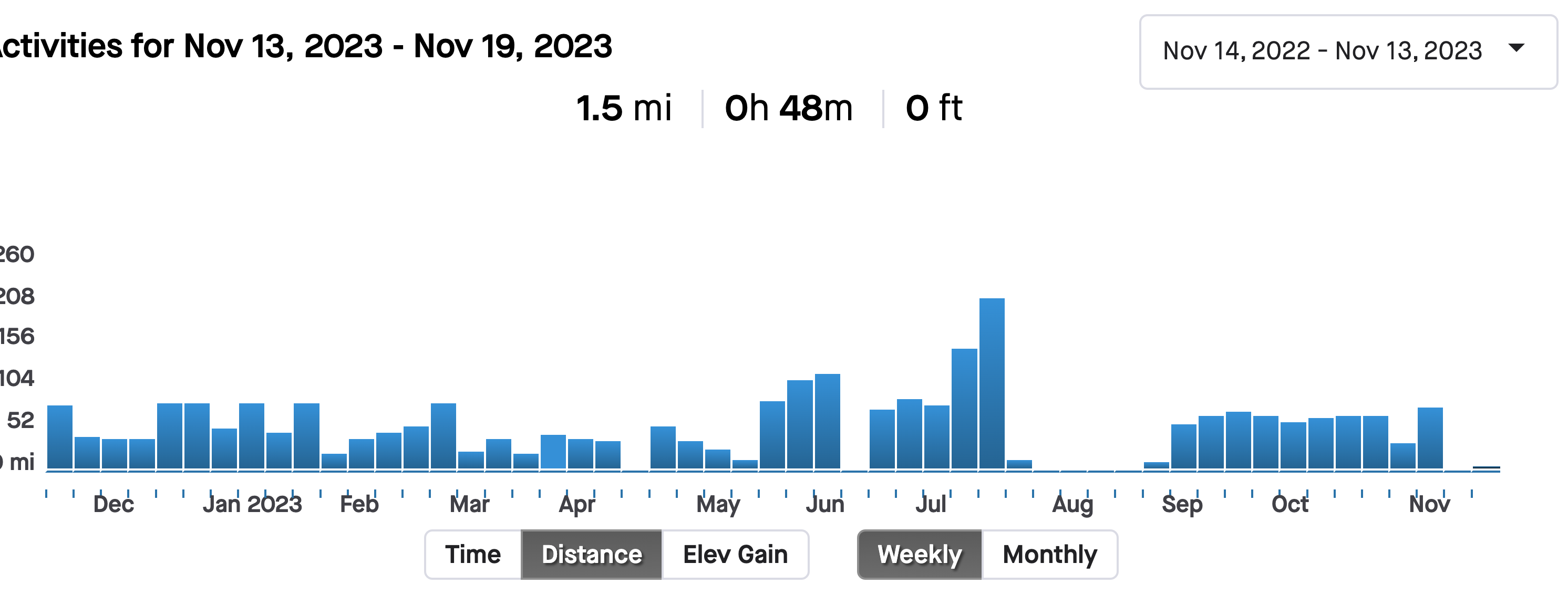
What do we love? Data!
Especially when the data is fun to aggregate and process. Finally some code!
I’ve been using a free Strava account for years now. It tracks my workouts and gives me some high-level information to share with friends and followers.
Desk Treadmill data
For each workout that I have been recording with the hardware from the previous post, I’ve specifically been naming them “Desk Treadmill” such that I could easily aggregate them in the future.
The future is now.
With some setup that I call out in my strava-api repository, I was able to start hitting the Strava API and collecting data. The fun? you can too!
It’s pretty easy and straightforward to get the tokens you need to repeatably collect activities from the API and process them how you see fit.
The code
For those who want to look at the code:
Code - Click Here
```Gopackage main
import ( “encoding/json” “io” “log” “net/http” “strconv” “strings” “time”
"github.com/spf13/viper")
type authResponse struct { AccessToken string
json:"access_token"ExpiresIn intjson:"expires_in"TokenType stringjson:"token_type"RefreshToken stringjson:"refresh_token"}type activity struct { Id int
json:"id"Name stringjson:"name"Description stringjson:"description"Distance float64json:"distance"MovingTime intjson:"moving_time"ElapsedTime intjson:"elapsed_time"Type stringjson:"type"StartDate stringjson:"start_date"StartTime stringjson:"start_time"EndDate stringjson:"end_date"EndTime stringjson:"end_time"}type envVars struct { StravaClientId string
mapstructure:"STRAVA_CLIENT_ID"StravaClientSecret stringmapstructure:"STRAVA_CLIENT_SECRET"StravaRefreshToken stringmapstructure:"STRAVA_REFRESH_TOKEN"}type historicalData struct { }
func (hd *historicalData) GetData() (int, error) { return 0, nil }
func (hd *historicalData) StoreData(year int, month time.Month, distance float64) error { return nil }
func main() {
// setup logging logger := log.Default() var config envVars // Load environment configuration - IE secret tokens viper.SetConfigName("strava") viper.AddConfigPath(".") viper.SetConfigType("env") viper.AutomaticEnv() err := viper.ReadInConfig() if err != nil { logger.Fatal(err) } if err := viper.Unmarshal(&config); err != nil { logger.Fatal(err) } // Create HTTP Client client := http.Client{} authUrl := "https://www.strava.com/oauth/token" activitesUrl := "https://www.strava.com/api/v3/athlete/activities" // Authenticate to get access token req, err := http.NewRequest("POST", authUrl, strings.NewReader("client_id=115159&client_secret=6e0451fb8dcfb7b4de3a16f56ffab22eb01df0cf&grant_type=refresh_token&refresh_token=d705e4806714d9a00f4a9a33aaeed4550b9fb252&f=json")) if err != nil { //Handle Error logger.Fatal(err) } q := req.URL.Query() q.Add("client_id", config.StravaClientId) q.Add("client_secret", config.StravaClientSecret) q.Add("refresh_token", config.StravaRefreshToken) q.Add("grant_type", "refresh_token") q.Add("f", "json") req.URL.RawQuery = q.Encode() res, err := client.Do(req) if err != nil { //Handle Error logger.Fatal(err) } body, readErr := io.ReadAll(res.Body) if readErr != nil { logger.Fatal(readErr) } // Unmarshall json response to struct var result authResponse if err := json.Unmarshal(body, &result); err != nil { // Parse []byte to go struct pointer logger.Println("Can not unmarshal JSON") } logger.Println("Authenticated - Preparing to get activities by page of 200") // Create a slice of activities to hold all activities activities := make([]activity, 0) page := 1 for { // Create a placeholder slice of activities for each page of results (200 max) pageActivities := make([]activity, 0) req, err = http.NewRequest("GET", activitesUrl, nil) if err != nil { //Handle Error logger.Fatal(err) } q := req.URL.Query() q.Add("per_page", "200") q.Add("page", strconv.Itoa(page)) req.URL.RawQuery = q.Encode() req.Header = http.Header{ "Authorization": []string{"Bearer " + result.AccessToken}, } res, err = client.Do(req) if err != nil { //Handle Error logger.Fatal(err) } body, readErr = io.ReadAll(res.Body) if readErr != nil { logger.Fatal(readErr) } if err := json.Unmarshal(body, &pageActivities); err != nil { // Parse []byte to go struct pointer logger.Fatal(err) } if len(pageActivities) == 200 { // if we get a total of 200 activities, there may be logger.Printf("Page %d retrieved with %d activities\n", page, len(pageActivities)) page++ activities = append(activities, pageActivities...) } else { logger.Printf("Page %d retrieved with %d activities\n", page, len(pageActivities)) activities = append(activities, pageActivities...) break } } // Log total number of activities logger.Printf("Total Number of activities: %d\n", len(activities)) var deskCount int var distance float64 for _, activity := range activities { if strings.ToLower(activity.Name) == "desk treadmill" { distance += activity.Distance deskCount++ } } // Log number of desk treadmill activities logger.Printf("Desk Treadmill Activities: %d\n", deskCount) // Log number of miles after converting meters to miles logger.Printf("Total Distance: %f Miles since September 12th \n", distance*0.000621371)}
Improvements
If I were not writing this for a specific purpose, I would have done a lot more. Breaking out the code into functions and overall modularity.
The results
2023/11/16 08:53:27 Authenticated - Preparing to get activities by page of 200
2023/11/16 08:53:31 Page 1 retrieved with 200 activities
2023/11/16 08:53:39 Page 2 retrieved with 200 activities
2023/11/16 08:53:45 Page 3 retrieved with 123 activities
2023/11/16 08:53:45 Total Number of activities: 523
2023/11/16 08:53:45 Desk Treadmill Activities: 43
2023/11/16 08:53:45 Total Distance: 64.614320 Miles since September 12th
Conclusion
I had a lot of fun building the pipeline that was hardware -> sensors -> platform -> data aggregation & processing.
I will continue to record my thoughts and walking data for future review.